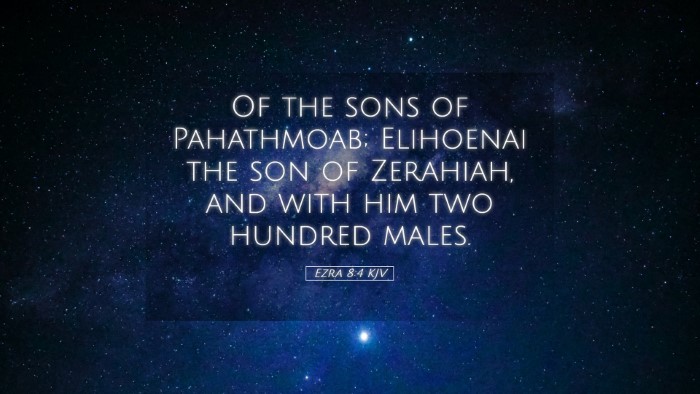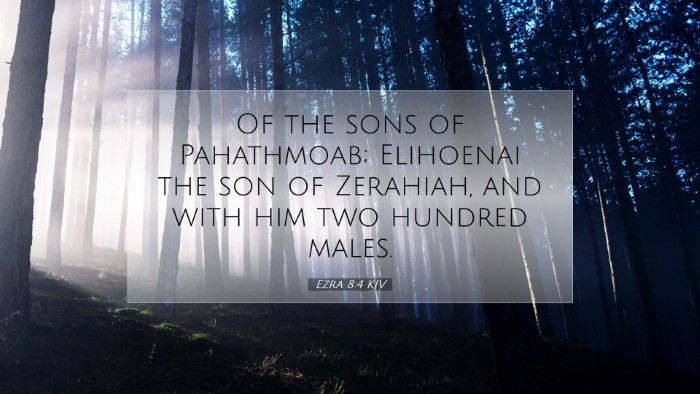Commentary on Ezra 8:4
Ezra 8:4 states: “Of the sons of Pahath-moab; Elihoenai the son of Zerahiah, and with him two hundred males.” This verse highlights a particular group within the context of Ezra's return to Jerusalem. It is essential to consider the significance of each element within this verse to understand its implications for the restoring community.
Contextual Background
In the broader context of the book of Ezra, this verse is situated within Ezra’s preparations for returning to Jerusalem after the Babylonian exile. Ezra, a scribe and priest, is mainly concerned with restoring the worship of God among His people and reestablishing the community's identity.
Insights from Commentaries
Matthew Henry
Matthew Henry emphasizes the importance of leadership and the organization of the return. He points out that the listing of names and numbers is not merely a census but indicates the order and structure essential for the community’s restoration. The sons of Pahath-moab, represented by Elihoenai, signify a commitment to the restoration process.
- Names as a Testament: The inclusion of names in the genealogies indicates their ancestral significance, highlighting God's faithfulness to His covenant people.
- Symbol of Unity: The unity represented by the two hundred males points toward a larger vision of community that Ezra sought to build.
Albert Barnes
Albert Barnes provides a detailed exposition on the names and their representations. He expounds that Elihoenai, the son of Zerahiah, shows royal or priestly lineage, which suggests that those returning were not just any individuals, but those with a historical and spiritual legacy.
- Importance of Ancestry: The references to ancestry confirm the seriousness of their mission and the divine providence in assembling such a group.
- Role of Men in Restoration: In biblical accounts, the male figures represent responsibility for the family and nation. Thus, the mention of two hundred males signifies a solid foundation for leadership and accountability.
Adam Clarke
Adam Clarke draws attention to the different tribes and their roles in the return to Zion. The sons of Pahath-moab had a crucial role in this endeavor, demonstrating that various groups contributed to the reestablishment of Jerusalem.
- Collective Responsibility: Clarke reminds us that the return was a collective responsibility, not confined to a single tribe or family.
- Historical Reflection: He reflects on how these men were also returning to fulfill promises made to God regarding the rebuilding of the temple and the city.
Theological Implications
This verse encapsulates critical theological themes relevant to scholars and clergy alike:
- Covenantal Theology: The passage reflects God’s unwavering commitment to His people through the present generations returning to Him.
- God's Sovereignty: The organization of the returnees illustrates how God orchestrated events and people in His providential plan.
- Community Restoration: It highlights the necessity of community and collective effort to restore what was lost due to exile, symbolizing the church's role in contemporary society.
Application for Ministry
For pastors and church leaders, Ezra 8:4 serves as a reminder of the importance of order, leadership, and community in ministry:
- Encouraging Unity: As Ezra did, modern leaders must foster unity among congregants to work towards communal goals effectively.
- Honoring Heritage: Recognizing and honoring the historical and spiritual heritage of the community can strengthen its identity and mission.
- Valuing Contributions: Pastors are encouraged to value every contribution, no matter how small, to the church’s mission, demonstrating that every member plays a role in God's plan.
Conclusion
Ezra 8:4 encapsulates the essence of return and restoration that defined the post-exilic community. The insights drawn from public domain commentaries highlight the importance of leadership, ancestry, and community unity in fulfilling God's call. As modern believers reflect on this verse, they are reminded of their individual and collective responsibilities in restoring and building the body of Christ.


